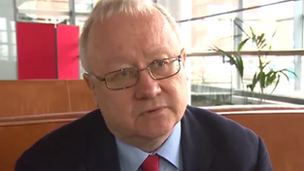Education review could remove school role from councils
- Published
Local councils in Wales could lose responsibility for running schools as part of a wide-ranging review.
It follows concern about pupils' performance and damning reports into some of Wales' 22 local education authorities (LEAs).
Education Minister Leighton Andrews warned the review will not rule anything out.
But local government leaders said they were "vehemently opposed" to cutting councils out of the system.
In a statement to the Welsh assembly, Mr Andrews said: "I have given local authorities time and money to get their house in order, but the evidence is overwhelming that this has not occurred."
He said the "fragmentation" of education services with the creation of 22 councils in the mid-1990s was a factor behind a downturn in performance by pupils a decade later.

Leighton Andrews says education authorities have had time and money "to put their house in order"
The Welsh government launched a programme of reform in education following disappointing results from an international comparison of school standards in 2009.
LEAs have been grouped into four regional consortia that have been charged with a responsibility to improve schools.
They have been up and running since September, but Mr Andrews told the Senedd chamber that "overall progress is, to put it mildly, patchy".
Options for the review, which will report by the end of March next year, include:
local authorities losing responsibility for school improvement;
introducing a regional delivery system for improvements;
merging council education departments under the joint management of a number of local authorities;
direct funding of schools by ministers, instead of through LEAs;
creating schools owned by local co-operatives.
Mr Andrews warned it could go as far as a proposal to remove all education functions from local government and create regional school boards accountable to the Welsh government, possibly without local council representation.
Since introducing a new inspection process in 2010, the schools inspectorate Estyn has not given any authority its top "excellent" rating.
Two of them - Anglesey and Blaenau Gwent - have been put in special measures.
An earlier report in March 2011 said a review should be conducted in autumn 2013 to decide whether structural changes were needed, but Mr Andrews said he was not prepared to wait until then.
'Lost patience'
The Welsh Local Government Association (WLGA) said it was "vehemently opposed" to removing education from councils and that recently-introduced changes need time to bed in.
WLGA leader Bob Wellington said: "This will fundamentally damage the principle of local democratic control and accountability, and undermine the ability of local communities to shape the educational future of young people."
Mr Wellington, who is also Labour leader of Torfaen council, said councils had met many of Mr Andrews' demands, including passing on more funding to schools and grouping schools into performance bands.
Opposition parties said the review was an admission of failure by the Labour minister.
Conservative education spokeswoman Angela Burns said: "Do we honestly think that centralisation is the best course of action?"
She added: "We have massive problems of underperformance in our education system, but we need a level-headed evidence-based approach to driving up standards not a bull in a china shop."
Plaid Cymru's Simon Thomas said education must not be a used as a "wedge to drive through local government reform".
"It is widely agreed that educational standards across Wales need to be improved and I am glad that the minister has opened this debate," he said.
Liberal Democrat AM Aled Roberts said: "Rather than providing stability and direction, today's decision throws a question mark over the whole future of education in Wales."
Philip Dixon, director of teaching union ATL Cymru, said the minister had "clearly lost patience" with local government.
"Some of the possibilities outlined are very radical indeed and could see local authorities lose any say over the delivery of education," he said.
The NAHT Cymru union said apart from rare exceptions, schools had not had a positive experience of the consortium system.
Union director Anna Brychan said: "Clearly the minister is hearing the same messages."
She welcomed the review, but said there needed to be local accountability for education standards and delivery.
NUT Wales secretary David Evans said teachers had to be consulted as part of the review.
He said: "There has been a lack of consistency from local authorities and the rush to instigate regional consortia working has not helped and left many schools in limbo."
- Published9 November 2012
- Published31 July 2012
- Published31 July 2012
- Published24 April 2012